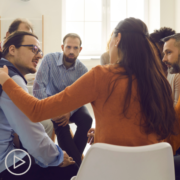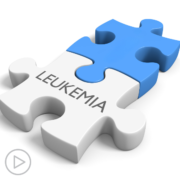Coping With AML | Financial and Mental Health Resources
Coping With AML | Financial and Mental Health Resources from Patient Empowerment Network on Vimeo.
What emotional and financial support is available for patients with acute myeloid leukemia (AML)? Dr. Alice Mims shares advice about how to access mental health support and financial assistance for AML care.
Dr. Alice Mims is a hematologist specializing in acute and chronic myeloid conditions. Dr. Mims serves as the Acute Leukemia Clinical Research Director at The Ohio State University Comprehensive Cancer Center – James. Learn more about Dr. Mims.
Related Resources:

|

|
Transcript:
Katherine Banwell:
Let’s talk a little bit about mental health resources. Managing the worry associated with a diagnosis or concerns about relapse, or even various side effects can lead to emotional symptoms like anxiety and fear.
Why is it important for people with AML to share how they’re feeling with their healthcare team?
Dr. Alice Mims:
So, I think it’s very important because, one, all of those feelings are normal feelings. I think they’re sometimes that from going through such a rapid diagnosis and then having to start treatment pretty quickly and going through all the ups and downs with these types of diagnosis can really lead to for some patients PTSD-type symptoms. And then there are also things that can evolve over time where their anxiety or even survivorship guilt as you go if you move forward and are doing well, where you may have some friends or people you met along the way who may not have had as good outcomes. And so, there are resources available based off of where you are.
But for survivorship, oncology-specific counseling to deal with some of these feelings that are understandable and normal for what patients have been through.
Katherine Banwell:
Can a social worker help? And are there other people on the healthcare team who can support a patient’s emotional needs?
Dr. Alice Mims:
Oh, absolutely. So, I think it’s really place-dependent on where you are but yes, absolutely. Social workers are a great resource for patients. There may be other collaborative teams based off of where you’re receiving your treatment that may be available that are maybe patient support groups where you can go and be with other patients or Facebook, social media support groups. And I think all those can be very helpful. And I know at least at our center, we also have patient mentors who have been through and gotten through to the other side of transplant or whatnot who are great resources, because they’ve lived and experienced it.
And I think that’s just as a physician, I can talk about things that I don’t have that personal experience having lived through it. And I think that’s very important…
Katherine Banwell:
Yeah. It’s a…
Dr. Alice Mims:
…to be able to have somebody to talk to. Yeah.
Katherine Banwell:
Yeah. What about the financial aspect of treatments? There are many people who would find it difficult to find and maybe they don’t have insurance, or their insurance doesn’t cover a lot. How do you help patients who are dealing with financial restrictions?
Dr. Alice Mims:
Sure. So, I think that we’re fortunate here because we have a lot of support staff to help patients with our financial counseling team. We also have people within the medication assistance programs who can help find foundation grants to help with medication support, travel support.
I think for patients who may not have those things available at their individual center, The Leukemia & Lymphoma Society is a great place to reach out for. And there are other foundations as well who at least may have navigators to help patients figure out other resources or funding available.











